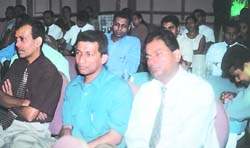
Members of the Sunday Times Business Club listen to a speaker at its monthly meeting last week. Pic. by J. Weerasekera.
Using your credit card wisely
By Suren Gnanaraj You take your friends out to dinner, and the waiter brings you the bill. Just like 321,000 people in Sri Lanka, you pull out your Master or Visa credit card, a simple but sophisticated piece of plastic, and place it along with the bill. Then you patiently wait until the waiter returns with your credit card, which he has taken to the cashier in a separate room. But did you see your credit card being swiped?|
Members of the Sunday Times Business Club listen to a speaker at its monthly meeting last week. Pic. by J. Weerasekera. |
Copyright © 2001 Wijeya Newspapers Ltd. All rights reserved.
Webmaster Editorial